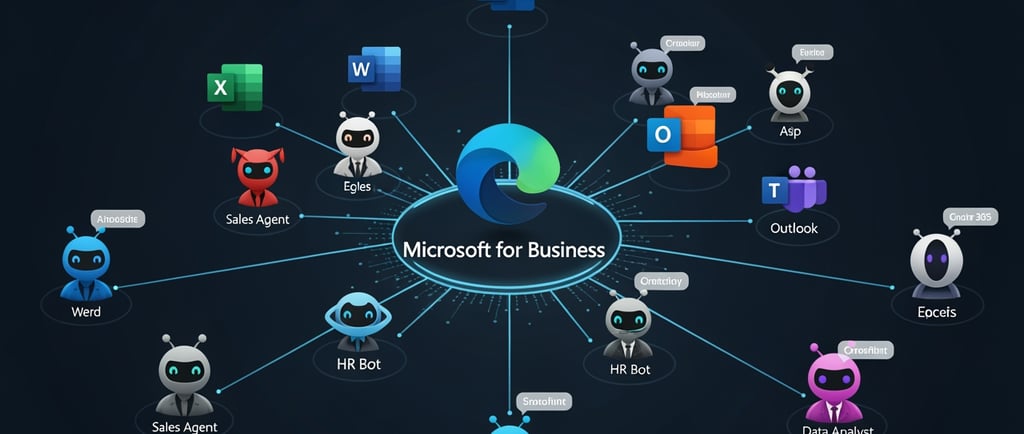Beyond Browsing: Microsoft Edge for Business Transforms into an Agentic AI Platform
The era of the passive web browser is ending. Microsoft Edge for Business is evolving into an "agentic platform," serving as the command center where custom AI agents automate workflows, analyze data, and act on behalf of employees.
AI, DATA & EMERGINGMICROSOFT


From Classic Browser to Agentic Platform: Edge for Business Changes Roles
For decades, the web browser has had a single, defined purpose: to act as a window to the internet. It was a passive tool used to view websites and run web applications. However, Microsoft is tearing up this script. With the latest updates to Edge for Business, the tech giant is repositioning the browser not merely as a viewer, but as an "agentic platform"—an active workspace where AI doesn't just answer questions, but performs work.
This strategic pivot marks a significant moment in enterprise technology, moving the browser from the periphery of productivity to the very core of business automation.
The Rise of the "Agentic" Browser
To understand this shift, one must understand the difference between Generative AI (like a standard chatbot) and Agentic AI. While a chatbot can write an email for you, an agent can open your email client, find the specific thread, draft the reply based on a CRM file, and—with permission—send it.
Microsoft is redesigning Edge for Business to be the container for these agents. By integrating these capabilities directly into the browser interface (specifically the sidebar and new floating interfaces), Edge becomes a distinct layer of intelligence that sits on top of the web, capable of interacting with the websites and SaaS applications employees use every day.
The New Hub for Copilot Agents
The core of this transformation is the deep integration with Microsoft 365 Copilot agents. These are custom-built AI assistants designed for specific business processes.
Context Awareness: Because these agents live in the browser, they can "see" what the user is working on. An agent designed for procurement can recognize when a user is on a vendor's website and automatically pull up internal contract data related to that vendor in the Edge sidebar.
Seamless Workflow: Users no longer need to switch context between a separate AI app and their browser. The agents travel with them across the web, ready to execute tasks like summarizing a SharePoint document or extracting data from a competitor’s public financial report.
Democratizing Automation with Copilot Studio
Microsoft’s strategy relies on the idea that every company is different. Through Copilot Studio, Microsoft is allowing businesses to build their own agents that run natively in Edge.
This "no-code/low-code" approach means that a marketing team, for example, can build an agent specifically for "Social Media Sentiment Analysis." When a team member browses X (formerly Twitter) or LinkedIn via Edge for Business, this custom agent can automatically analyze the visible posts and generate a sentiment report without the user ever leaving the page. The browser effectively becomes a custom operating system tailored to the specific needs of that department.
Security and Governance: The "For Business" Difference
The transition to an AI-driven platform raises obvious concerns about data security. This is where the "For Business" designation becomes critical. Microsoft has architected this platform to ensure that enterprise data does not leak into consumer AI models.
Data Boundaries: Enterprise agents operate within the Microsoft 365 trust boundary. Data processed by the browser’s AI agents is not used to train public models.
IT Control: IT administrators retain full control over which agents can be deployed, who can access them, and what websites they can interact with. This turns the browser into a managed environment where innovation does not come at the cost of compliance.
Conclusion: The Browser as a Workspace
We are witnessing the death of the browser as a passive utility. By turning Microsoft Edge for Business into an agentic platform, Microsoft is betting that the future of work isn't about visiting websites, but about having an intelligent layer that helps you interact with them.
For competitors like Google Chrome, the challenge is now clear: the browser war is no longer about speed or rendering engines—it is about who can build the smartest, most capable assistant for the modern workforce.
Sources
Microsoft Official Blog - "The Future of Work with Copilot and Edge"
TechCrunch - "Microsoft Ignite 2024: Edge becomes the home for AI Agents"
The Verge - "Why Microsoft is turning its browser into an operating system for AI"


